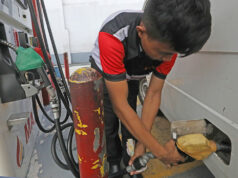Online gaming seen to lure more into real estate
By Denise A. Valdez, Reporter
THE Philippine real estate industry is projected to attract more investors this year due to the continuous rise in demand from online gaming operators, relatively cheap leasing rates compared to other countries and new catchments from regional peers.
In a briefing on Thursday about its real estate market overview and outlook, consultancy firm Jones Lang LaSalle (Philippines), Inc. (JLL Philippines) said 2020 is a good time for investors to come in given the maintained momentum of online gaming, slowdown in residential prices, new laws concerning the industry, and lifestyle trend of shared spaces.
“We do think the Philippines will be a good investment destination for 2020, and we’re seeing that now in terms of [increase in] clients who inquired: a lot of foreign investors and a lot of local players who are diversifying; not just major real estate developers, but also first time developers who are diversifying their portfolio,” JLL Philippines Head of Research Janlo de los Reyes said.
He noted the robust growth of the Philippine offshore gaming operator (POGO) industry — which grew the fastest in office take-up last year at 52.3% — is seen to continue this year with demand reaching outside Metro Manila to the cities and municipalities of Cavite, Laguna, Clark and Cebu.
Residential prices are also seen to grow at a slower pace to an annual average growth of 3.1% this year, which Mr. de los Reyes attributed to condominium developers’ “testing” of the market, whether it still has the appetite to absorb rising price points.
Another expected driver of the industry’s growth, he said, is greater focus from buyers on building resiliency and sustainability, following the earthquakes in Davao last year and the eruption of Taal volcano earlier this month.
The trend of co-living, co-working and co-storage spaces is also expected to affect the approach of developers in new projects.
New policies from the government such as the guidelines for real estate investment trusts (REITs), the pending tax reform bill and proposed amendments to the Retail Trade Liberalization Act are also seen to be big influences to the industry.
Amid the uncertainties from a regulatory perspective, Mr. de los Reyes said there’s “a lot of opportunities in the Philippines [in 2020].”
“For the office, I think we’re still relatively cheap in terms of the rents… For residential, again we’re also cheaper than other markets still… The retail, hopefully the Retail Trade Liberalization Act pushes through so we can find more retailers. For industrial, I think it’s a heavily underserved market,” he said.
He added the conflict in Hong Kong and the banning of online gaming in Cambodia may push locators to consider investing in the Philippines. “I think we still have good fundamentals. And I guess that’s what’s really pushing the growth further into its extended run.”
In JLL Philippines’ City Momentum Index 2020, Manila was ranked eight most dynamic city in the world, moving up its 12th spot last year. This list covered 130 city-regions around the globe and were ranked based on “short-term economic and commercial real estate momentum.”
“The remarkable dynamism in the emerging Asian economies is proof that economic reforms, business growth and infrastructure investment can drive the expansion of industry, significantly in the tech sector, and facilitate a start-up culture,” Jeremy Kelly, director of cities research at JLL, was quoted as saying in a statement.
Mr. de los Reyes said this is one of the reasons JLL Philippines is optimistic about real estate growth in the country in 2020.
Topping JLL’s City Momentum Index 2020 are Hyderabad and Bengaluru in India, Ho Chi Minh City in Vietnam, Nairobi in Kenya and Chennai in India.



